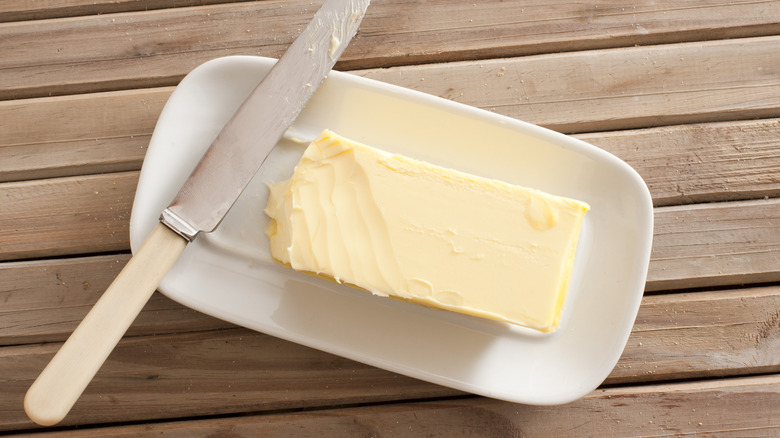How Butter Was Once Actually Used As A Tax
Butter has been around for about 10,000 years. It was one of civilization's first uses of dairy. There are many kinds of butter and even more applications for it in every conceivable cuisine. So it probably doesn't come as a surprise to find out that butter was one of the most commonly taxed commodities in Europe during the Middle Ages. In the 11th century, the king of Norway ordered his residents to annually provide him with a whole bucket of the stuff.
Most medieval farmers were obligated to pay roughly 2% of the value of their farm back to the land owner or king. This tax could be fulfilled in silver, but since butter was one of the most common liquid assets on hand, 16 kilograms of freshly churned was usually the currency of choice. When you take into account that it takes 25 pounds of milk to yield only one pound of butter (a back-breaking process of churning and processing reserved exclusively for women), you can begin to see why it was so highly valued. Others soon took note of this particularly delicious form of payment.
Butter's history as a cash cow
In the later half of the Middle Ages, butter was one of Scandinavia's most valuable exports. Initially regarded as peasant food, it didn't take long before wealthy people were serving it on their tables, usually with bread or meat. Butter became so popular that the Catholic church actually prohibited people from eating butter during Lent, and thus, the Lenten butter fee was imposed. (Although one could simply pay the church for permission to eat it during the otherwise forbidden window of time.) However, most people who could afford to pay the fee did. This is how the Catholic Church built the Rouen Cathedral in France (which consequently became known as the Tower of Butter.)
The story of butter is as old as it is complex. It was one of the first things to disembark the Mayflower, and by the beginning of the 20th century, Americans were consuming around 18 lbs per capita annually. We may not be able to pay our taxes with butter anymore, but it is and has always been, a pillar of wealth. Whether it's salted, whipped, or clarified, butter will abide.

